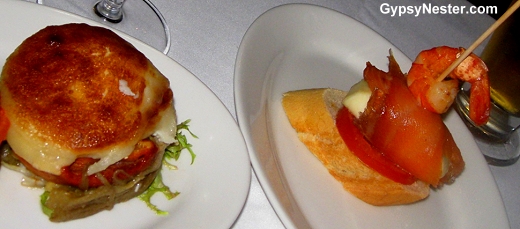
Tapas are a way of life in Spain. In fact, we have made it a point to include an evening of enjoying them every time we travel through this beautiful country.
Along the way we have found that while there are definite similarities throughout the country. Ham, olives, and cheese are nearly universal, each region has some unique variations.
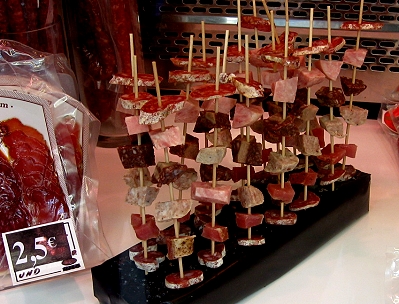
We learned that in the Basque region tapas are called pintxos, made with small slices of bread topped with a mixture of ingredients. A toothpick is used to hold things together, which is where the name comes from, “pincho”, means spike. The “tx” spelling is Basque for the “ch” sound.
In Madrid we found fantastic offerings on almost every street corner. Then in Catalonia we could hardly imagine a visit to one of our favorite cities in the world without indulging in a few tapas tours in Barcelona.
But now, like everything else, the Covid pandemic has changed how people feel about going out and socializing while enjoying these delicious bites. Restrictions, and people’s hesitancy to be in public places, has caused this delightful custom to suffer huge setbacks.
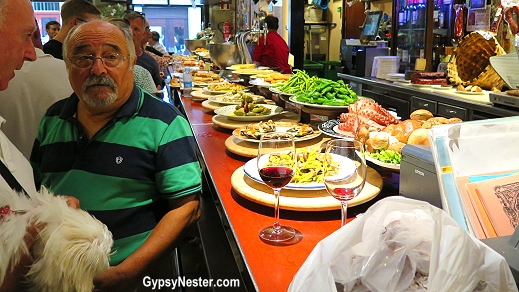 We love everything about Tapas, so we certainly hope that this is a temporary situation and that in the near future things can and will get back to normal.
We love everything about Tapas, so we certainly hope that this is a temporary situation and that in the near future things can and will get back to normal.
But if we are to explore the future of tapas in Spain, perhaps we should begin by looking back at the origin of tapas. That brings to mind two questions, how did tapas begin, and how did they get so popular?
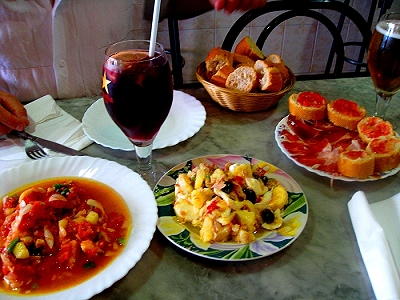 As with most things that have been around for centuries, there are any number of stories about where, when, and how Tapas first appeared. Several of them revolve around royalty, usually a king, discovering just how dandy it was to have a little snack with his drink.
As with most things that have been around for centuries, there are any number of stories about where, when, and how Tapas first appeared. Several of them revolve around royalty, usually a king, discovering just how dandy it was to have a little snack with his drink.
Of course, back in those days pretty much everything had to start with the king, and then the rest of the folks would follow along. However, some of the other stories that don’t involve royalty sound more likely to us.
Such as, serving a drink with a saucer on top of it to keep the flies out, or covering cheap wine with a plate of strong cheese to hide the smell. Both of these fit well with the meaning of the word tapas, which is a cover or a lid.
Another likely story is that because tapas bars were designed as standing-only for customers, people who ordered a snack had nowhere else to put their plates except on top of their glass.
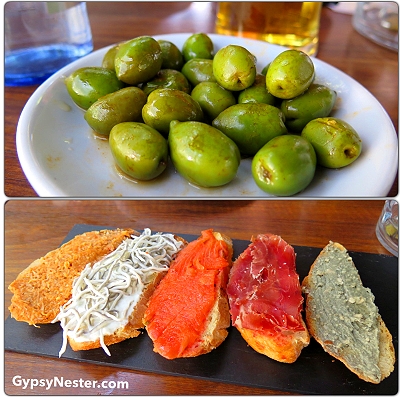 No matter how it all began, the whole process is very social. People stand and talk, share food from communal plates at the bar, and generally eat with their fingers, so it is easy to see how this became such a popular pastime.
No matter how it all began, the whole process is very social. People stand and talk, share food from communal plates at the bar, and generally eat with their fingers, so it is easy to see how this became such a popular pastime.
On the other hand, it may not be the best situation in our current Covid risk reduction environment. But we hope that as vaccination rates increase, and they are now nearly 80% in Spain, things will begin to return to how they were pre-pandemic.
Another big step toward getting back to normal is how tapas tours organizers are coming up with creative ideas to improve people’s protection while still enjoying this wonderful tradition, and how participants are open to cooperating in order to ensure everyone’s safety.
We feel confident that the next time we visit Spain, hopefully next year, we will be perfectly comfortable enjoying everything about the palate pleasing practice of partaking in tapas to our heart’s content.
David & Veronica, GypsyNester.com
We are happy to present this collaborative post to offer valuable information to our readers.



Wow, awesome blog!